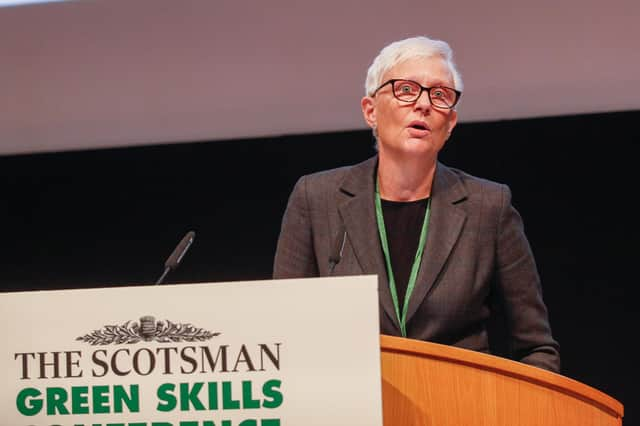Sustainable Scotland conference report: What is needed for a nature-based green economy


Claudia Rowse, head of sustainability at NatureScot, warned that the existing nature-based workforce was “insufficient in capacity, skills and training” to help tackle the climate crisis and support green economic recovery.
It is estimated that 7,000 new nature-based roles will be needed in Scotland in the next ten years. And this matters because the nature-based sector is responsible for 30 per cent of emissions.
Advertisement
Hide AdAdvertisement
Hide AdRowse said: “On the back of COP26, there’s been a lot of talk and growing awareness of the importance of nature-based solutions as part of our essential way of meeting these climate change targets. It’s not just economic prosperity, but also putting ecological prosperity at the heart of our green recovery.
“It’s about natural flood management, as well as hard engineering; it’s about green infrastructure in our towns and cities. It’s about coastal habitat management. It’s about woodland regeneration, low carbon and ecological farming practices and peatland restoration.”
Rowse said the nature-based sector was on a steep learning curve in terms of getting skills and supply chains in place to play a big part in hitting net-zero targets. A huge variety of jobs would be needed, she added, with the opportunities to create new industries. It is also vital to learn from industries already well down the green jobs route.
“We need much better links into schools to inspire and inform young people about what a job in the nature-based sector means,” she said. “We need to learn how we offer young people an attractive and well-paid and stable job in a sector which is growing.”
Conference chairman Dave Reay supported Rowse’s call for a more rounded approach. He said: “This is not just about decarbonisation, not just about getting our economies to net-zero. It is doing that, but doing it in a climate-resilient way.
“If we look at [the land-based industries] with carbon blinkers on, we will fail. That will be an unsustainable transition, not just in terms of its resilience to the impacts of climate change, but also for communities and livelihoods.
“The nature crisis is going on simultaneously to the climate crisis, and there are very many overlaps in terms of the challenges, and in synergies.”
In the breakout session on digitalisation, Marc Strathie of ScotlandIS suggested the agriculture sector, for example, would benefit from a “show and tell” approach, because seeing technologies that worked and helped your sector was extremely powerful.
Advertisement
Hide AdAdvertisement
Hide AdSakshi Sircar of the Net Zero Technology Centre made a similar point, with relation to smarter techin the land and nature-based industries. She said: “You have to make it clear to a person what the benefit is for them, not focus on the negatives. You have to create that benefit package.”
Jo Freeman-Young, head of sustainability at EY, agreed that healthy ecosystems and good social welfare had to be present alongside economic growth if we were to talk about true sustainability.
This was challenging in countries that still depended on coal, for example, she said – and in Scotland, these considerations were the basis of the just transition from oil and gas.
She asked: “Are we setting the right policy? Do we have investors putting money in the right places? What about consumers? We need to make sure we’re trying to drive that change in consumer behaviour which is much more difficult to do.”
Businesses and colleges must work together on future training
Apprentices must be engaged in thinking about the low-carbon future – and what skills they will need in years to come.
Carol Turnbull, principal of Ayrshire College, said the skills needed right now still had to be taught, as well as what would be required in future: “We still need gas engineers and traditional plumbers. How do we do that alongside new skills people need to learn?” One way to do it was to involve apprentices in “challenge projects” to get them thinking what future work might look like.
Ryan Matthews, left, an apprentice aero engine mechanic at GE Aviation Caledonian, described his involvement in the Fuel Change Challenge, where apprentices looked at alternative low-carbon fuels of the future. He said examining options around seaweed farming had been a “fantastic experience” and raised his awareness of climate issues, as they weren’t central to his school education.
Advertisement
Hide AdAdvertisement
Hide AdHe has taken this heightened climate interest back into work in terms of looking at issues including plastic use and recycling in his workplace.
Carol Turnbull said it was vital to understand that different industries were at very different stages in terms of adopting low-carbon solutions.
“We need to accelerate the pace, but skills must be demand-led – and actually led by industry, and the government policies that are in place. Colleges need to work with local employers on this and businesses need Scottish Government support to help them to change.”
Colleges also needed to upskill their staff to ensure they could support this green transition, she added.